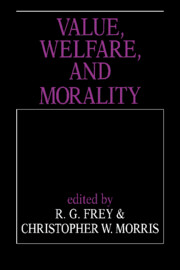Book contents
- Frontmatter
- Contents
- List of contributors
- Preface
- 1 Value, welfare, and morality
- 2 The land of lost content
- 3 Putting rationality in its place
- 4 Can a Humean be moderate?
- 5 Welfare, preference, and rationality
- 6 Preference
- 7 Reason and needs
- 8 Desired desires
- 9 On the winding road from good to right
- 10 Value, reasons, and the sense of justice
- 11 Agent-relativity of value, deontic restraints, and self-ownership
- 12 Agent-relativity – the very idea
- 13 The separateness of persons, distributive norms, and moral theory
- 14 Harmful goods, harmless bads
1 - Value, welfare, and morality
Published online by Cambridge University Press: 07 December 2009
- Frontmatter
- Contents
- List of contributors
- Preface
- 1 Value, welfare, and morality
- 2 The land of lost content
- 3 Putting rationality in its place
- 4 Can a Humean be moderate?
- 5 Welfare, preference, and rationality
- 6 Preference
- 7 Reason and needs
- 8 Desired desires
- 9 On the winding road from good to right
- 10 Value, reasons, and the sense of justice
- 11 Agent-relativity of value, deontic restraints, and self-ownership
- 12 Agent-relativity – the very idea
- 13 The separateness of persons, distributive norms, and moral theory
- 14 Harmful goods, harmless bads
Summary
In addition to an account of motivation, every normative ethical theory must contain an account of value, and the link that is often forged between what is valuable and what it would be right or what we ought to do is human welfare or well-being. While this linkage is not new, it has become a source of considerable controversy in contemporary ethics, not least because of the general reconsideration of utilitarianism that has been underway for some time now. Indeed, it often seems that there is as much disagreement about the nature of value and its relationships to welfare and morality as there is about the substantive issues on which our normative theories are supposed to pronounce.
Both in philosophy and the social and policy sciences, two general pictures of value and of its link to welfare and morality haunt contemporary discussions in the Anglo-American world. Both general pictures are inherited from David Hume and Jeremy Bentham and from the tradition of political economy founded by Adam Smith and David Ricardo. From Hume, there develops an instrumental view of rationality, of reason in the service of the passions; while reason can assist one in obtaining one's ends, what these ends are depends upon one's passions. This widely influential view of rationality is associated today with desireor preference-based conceptions of welfare (and with conventionalist or even contractarian accounts of justice). From Bentham and nineteenth-century economics, there develops the rival though quite friendly view of utilitarianism, in which the focus is on aggregation of pleasures and pains over persons generally and in which reason assists one in the pursuit of this impersonal though welfarist end.
- Type
- Chapter
- Information
- Value, Welfare, and Morality , pp. 1 - 12Publisher: Cambridge University PressPrint publication year: 1993



